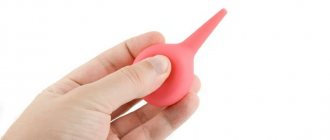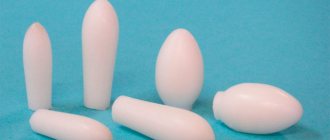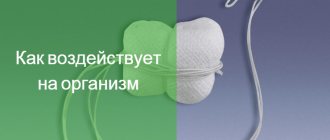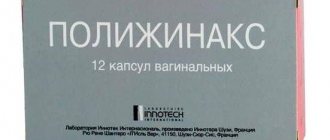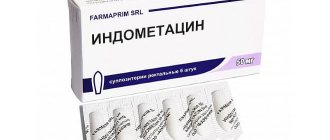Inflammation of the ovaries (oophoritis) is often accompanied by inflammation of the uterus and its appendages (adnexitis). Almost every woman of reproductive age has encountered this gynecological disease. Treatment should be comprehensive and include antibacterial and anti-inflammatory therapy, as well as drugs to enhance immunity and vitamins.
Next, we’ll look at which pills for ovarian inflammation are the most effective.
Pros and cons of suppositories as a dosage form in the treatment of gynecological diseases
When prescribing suppositories, the doctor focuses on the advantages of the local dosage form:
- fast absorption;
- action directly on the site of pathology;
- lack of systemic effect;
- minimal risk of allergic reactions;
- the entire therapeutic dose of the drug is delivered to the site of the lesion;
- there is no load on the kidneys and liver.
Among the disadvantages is that different suppositories help against different diseases. Therefore, you need to know what disease a woman has.
When used, the oil base melts, staining laundry. Therefore, some women do not like to use topical remedies. For a number of conditions, the use of suppositories is prohibited (diabetes mellitus, thyroid dysfunction, arterial hypertension).
Pills
Very often, inflammatory processes are accompanied by pain in the lower abdomen.
To reduce them, various means are used:
- Nurofen. The active ingredient is ibuprofen. The medicine belongs to the group of non-steroidal anti-inflammatory drugs. The daily dosage of the medication is 1200 mg, which is divided into several doses. Very often, when using this remedy, gastrointestinal upset, shortness of breath, heart rhythm disturbances, etc. occur. If used for too long, the product may contribute to the occurrence of gastrointestinal erosions. The drug is not recommended for use in case of hypersensitivity to the main substance, various blood pathologies, hypertension, etc.
In addition to painkillers, antihistamines are used:
In especially severe cases, for example, with inflammation of the appendages, glucocorticoids are prescribed:
- Betamethasone. The active substance is betamethasone. The medication has anti-inflammatory, anti-edematous, anti-allergic and antipruritic effects. The drug is not recommended for use in case of hypersensitivity to the main component, immunodeficiency conditions, gastrointestinal pathologies, cardiovascular diseases, renal and liver failure. Negative manifestations include sleep disturbance, dizziness, pain in the head, weight gain, allergic reactions and much more.
- Prednisolone. The active ingredient is prednisolone. The product has anti-inflammatory, antiallergic, immunosuppressive effects. Contraindications include: hypersensitivity to the active component, immunodeficiency states, pathologies of the gastrointestinal tract and cardiovascular system, endocrine disorders, severe renal and liver failure. Side effects: nausea, vomiting, menstrual irregularities, headache, increased intracranial pressure, etc.
Such remedies quickly eliminate inflammation and pain. But they have one main drawback - these drugs significantly reduce immunity.
To increase the body's defenses, the following are prescribed:
Remember that any remedy, even the safest one, causes negative manifestations, so you should not self-medicate. At the first signs of inflammation, contact a medical facility.
Medicinal groups of suppositories for women: classification
Anti-inflammatory suppositories for women belong to different groups of drugs. The suppository form is a method of drug delivery, but not an indication of the active substance.
I produce suppositories of drugs belonging to several categories:
- anti-inflammatory;
- preventive;
- to restore microflora;
- with a regenerating effect;
- antimycotic.
Anti-inflammatory suppositories for women can be used as vaginal, rectal, uterine, depending on the place where they are placed. They can fight various pathogens (bacteria, viruses, protozoa, fungi).
When taking antibiotics or changing hormonal levels, the balance of normal microflora is disrupted. The acidic environment is replaced by a neutral or alkaline one, which creates favorable conditions for the proliferation of microorganisms. After treatment, it takes some time to restore the microflora. To help the body during this period, products with lactobacilli are used.
When immunity decreases, fungal flora can be activated. To overcome it and prevent generalization of the infection, suppositories with a similar effect are used.
Preventive suppositories are needed when inflammation has not yet developed, but there is already a change in the smear. These are antiseptic compounds that can help even when there is already inflammation. Some species contain immunomodulatory components.
Natural-based products (usually oils) help restore the mucous membrane damaged by inflammation and soothe. Most often, suppositories have several effects at once to quickly cope with pathological conditions.
How to properly administer anti-inflammatory suppositories for women
Classification of suppositories involves division according to the type of main component. These are steroidal and non-steroidal substances in the base.
Preventive actions
By adhering to the rules and recommendations, you can avoid big problems in gynecology.
- Strict adherence to intimate hygiene
- Regular examination by a gynecologist (at least 2 times a year)
- Proper nutrition
- Leading a healthy and active lifestyle
- Use of barrier protection during sexual intercourse (especially if a woman is not confident in her partner)
Remember that women's health is not a toy. No one except you yourself will take better care of him. Pay close attention to your body, especially since it always tries to send certain signals at the slightest changes. At the first symptoms of gynecological inflammation, consult a doctor, otherwise the consequences can be fatal, including infertility. Do not self-medicate - nothing good will come of it.
Noticed a mistake? Select it and press Ctrl+Enter to let us know.
The human body, for all its perfection, is poorly made. Viruses, microbes, and inflammatory diseases try to put a person in a hospital bed for a long time.
The health of the future toddler depends on the state of the female reproductive system.
Even if a baby is not included in your plans yet, then monitoring the correct functioning of the genital organs is not only useful, but extremely important for any girl.
No woman is immune from inflammatory diseases. Of course, it is easier to prevent a disease than to treat it. But if you are already sick, then you need to scrupulously follow all the doctor’s orders.
What diseases are treated with vaginal suppositories?
Anti-inflammatory suppositories for women help with the development of the following diseases:
- dysbacteriosis;
- fungal infection of the genital organs;
- vaginitis;
- cervical erosion;
- endometritis;
- bacterial vaginosis;
- inflammation of the pelvic structures (fallopian tubes, ovaries, uterus);
- chlamydia.
Inflammation occurs due to a number of factors: the action of a pathogen, weakened immunity. During the process, damage to the organ wall, swelling of the mucous membrane, and a local increase in temperature occur.
What should you know?
Despite the excellent characteristics, suppositories for inflammation in gynecology cannot be used independently. It is very important to discuss the use of such drugs with your doctor. This is especially true for women who suffer from systemic pathologies, hypertension, diabetes, and thyroid diseases.
For example, the excellent drug Betadine, which is a powerful antiseptic and can get rid of many microbes, contains iodine. For patients diagnosed with thyroid diseases, this remedy can seriously harm.
Therefore, before using any candles, read their instructions very carefully. It’s best to go to an appointment with a gynecologist. In this case, the therapy will be completely safe and at the same time most effective.
Review of the best candles: indications, contraindications, instructions
Anti-inflammatory suppositories for women belong to different pharmacological groups. The list of conditions for which their use is indicated is not limited to inflammatory changes in structures. Each drug has its own list of indications. Some are based on synthetic components, others are natural. The most common means are described below.
Polygynax
This is a complex product containing antifungal and antibacterial components, Polymyxin B, Neomyxin and Nystatin. It is used to combat thrush, vaginitis, spreading to the cervical canal and vulva, of nonspecific and mixed origin. Contraindications to the use of suppositories are pregnancy and lactation, intolerance to the components of the product.
The capsule should be used at night, before bed, in a lying position, placing it as deeply as possible in the vagina. The duration of treatment is determined by the attending physician.
Terzhinan
Refers to steroid drugs, used for:
- gardnerellosis;
- trichomonas infection;
- ureaplasmosis;
- reproduction of Staphylococcus aureus;
- gram-negative bacteria (including Pseudomonas aeruginosa);
- thrush;
- colpitis;
- nonspecific vaginitis.
The composition includes ternidazole, neomycin, prednisolone, nystatin. Contraindications to the prescription are individual sensitivity to the components, age under 16 years.
Before using the product, you need to dip the tablet in water for a few seconds, then, while lying down, insert it deep into the vagina. The average course of treatment is 10 days.
Meratin-Combi
Tablets for vaginal use consist of antibacterial and glucocorticoid components: ornidazole, neomycin, nystatin, prednisolone. Thanks to this, the reproduction and vital activity of bacteria stops, their DNA apparatus is damaged, and swelling and inflammation of tissues are reduced.
The drug is prescribed for:
- sanitation of the birth canal before childbirth;
- prevention of diseases during gynecological operations;
- treatment of cervical erosion with laser method;
- safe use of the IUD immediately before use and after removal;
- reducing the risk of inflammation during colposcopy.
Review of effective pills for menstrual pain relief
Let's take a closer look at each group of medications so that you understand what painkillers you can take during your period.
First, try to make yourself feel better with a warm heating pad (place it on your stomach) or hot tea with cognac or balm. Lie down in bed and take a comfortable position. If all else fails, open the first aid kit.
Nonsteroidal drugs
Drugs from the group of non-steroids suppress the inflammatory process and relieve pain. To treat dysmenorrhea, they begin to be taken 2–3 days before menstruation.
They are usually prescribed to patients who refuse hormonal medications and do not even take contraceptives. Another option is the presence of contraindications to hormonal therapy.
Non-steroidal anti-inflammatory tablets for menstrual pain may have different names:
- Paracetamol – effective for mild/moderate pain. Can be taken up to 4 times a day. Contraindications: alcohol dependence, liver and kidney pathologies.
- Ibuprofen - reduces the frequency of uterine contractions and reduces pressure in its cavity. Tablets are taken after meals 3-4 times a day. Contraindications for Ibuprofen are hemophilia, ulcer, liver or kidney failure, asthma, duodenal ulcer.
- Diclofenac - inhibits prostaglandin synthesis. Can be taken 3 times a day. Contraindications – asthma, inflammatory processes in the gastrointestinal tract, ulcers. Analogues - Rapten, Voltaren, Naklofen, Sanfinac, Diclovit.
- Naproxen – for dysmenorrhea, take twice a day. Contraindications – lactation, bronchospasms, ulcers in the digestive system. Analogues - Pronaxen, Sanaprox, Apranax, Nalgesin.
- Ketoprofen - like Diclofenac, inhibits the production of prostaglandin and affects the contractile function of the uterus. Take tablets/capsules 2 – 4 times a day. Analogues of Ketoprofen are Flamax, Dexalgin and Ketonal. Contraindications – hemophilia, ulcerative colitis, inflammatory diseases of the gastrointestinal tract, abnormal functioning of the liver and kidneys.
Despite contraindications, Ibuprofen and Paracetamol are considered the safest non-steroidal drugs. You can get rid of menstrual pain by taking combination drugs containing paracetamol and ibuprofen - Khairumat, Next, Brustan, Ibuklin.
Antispasmodics
The assortment of antispasmodics has its own painkillers for menstruation. The most famous remedy is No-shpa with drotaverine.
Names of the most effective suppositories for inflammation of the appendages and ovaries
If a woman has adnexitis, that is, inflammation of the ovaries, the doctor most often prescribes:
- suppositories with ichthyol;
- longidase;
- mycogynax;
- suporon;
- suppositories with indomethacin;
- diclofenac;
- methyluracil.
Since the infection is often transferred to other adjacent structures, it may be necessary to use agents active for cystitis.
Anti-inflammatory herbs
Herbal medicine is often included in the complex treatment of various diseases. Decoctions and herbal extracts are also used in gynecology.
The most commonly used are chamomile, oak bark, sage, and calendula. It is important to understand that herbs are medicines. They have indications, contraindications and side effects.
Many gynecological diseases cannot be treated with herbs. Therefore, you should not self-medicate, even with the help of herbs. First you need to see a gynecologist, undergo an examination, take tests, and only after that the doctor can determine the course of treatment.
List of inexpensive suppositories for cystitis
Cystitis is caused by an infectious agent, against the background of hypothermia, decreased immunity. Due to the anatomical features of the structure of adjacent structures, the process often spreads to the genitals. The approach to treatment must be comprehensive.
In the treatment of cystitis in men and women, suppositories are used:
- methyluracil;
- diclofenac;
- Kyzyl-May;
- suppositories with ichthyol.
In addition to the anti-inflammatory and antiseptic effect, the patient needs pain relief.
Suppositories can also be used for this:
- papaverine or other antispasmodics;
- geneferon;
- sea buckthorn
For cystitis, it is also important to ensure an antibacterial effect:
- Hexicon;
- Pauline;
- McMimon;
- Betadine suppositories;
- Syntomycin.
When diagnosing cystitis, the doctor considers the option of choosing suppositories with a complex effect in order to reduce the list of drugs used.
Causes of painful periods
Primary dysmenorrhea is more common in adolescent girls and nulliparous patients. Its causes lie in heredity, poor nutrition, lack of sexual activity and its irregularity.
The condition during menstruation is worsened by several other factors:
- Avitaminosis.
- Abortion.
- Bend of the uterus.
- Underdevelopment of the genital organs.
- Hormonal disorders.
- Use of an intrauterine device.
- Postpartum period.
- Incorrect location of the internal genital organs.
Secondary dysmenorrhea develops against the background of diseases of the pelvic organs and gynecological disorders of an inflammatory nature. The pain is accompanied by copious discharge with clots.
A strong painkiller will not help here, because the pain will subside for a short time, then it will return and will cause anxiety until the end of your period.
Taking painkillers is effective only for primary dysmenorrhea. In the second case, to eliminate pain during menstruation, you must first be examined and receive an appropriate course of treatment.
List of suppositories for polyps in the cervix
Although medical science does not recognize the success of conservative treatment of polyposis, if foreign bodies are detected in the lumen of the cervix, local remedies can be prescribed.
They are used in conjunction with surgical methods or in isolation:
- belladonna candles;
- with a decoction of celandine;
- with sea buckthorn oil.
The doctor selects the optimal remedy and dose based on the diagnosis and the severity of the disease. To combat polyps, natural-based products are used. They are classified as auxiliary means, helping to slightly reduce the size of the formation or slow down its growth.
Anti-inflammatory suppositories for various diseases for women can suppress the growth of pathogenic microorganisms, provide antiseptic, antispasmodic and analgesic effects. The choice is made after determining the type of pathogen by culture of urine, a smear from the vagina or the cervical canal.
Author: Dyleiko V.L.
Antibacterial agents
It was already mentioned above that when, for example, adnexitis is detected, broad-spectrum antibiotics are first prescribed. First, it is recommended to pay attention to the most popular and most common drugs, which have been noted by many doctors and patients.
List of highly effective products:
- From the penicillin group: Amoxicillin, Ampicillin, Ticarcillin.
- Tetracycline group: Tetracycline.
- Fluoroquinols: Moxifloxacin, Gatiprofloxacin.
- Levomycytin.
- Streptomycin.
- Stagepeneme.
In addition to them, we should also highlight such popular drugs as:
- Cefixime
- Sumamed
- Amoxiclav
- Lincomycin
- Rulid, etc.
When taking such medications, it is important to strictly follow the prescribed dosage by your doctor. In addition, in parallel with them, it is worth taking prebiotics to prevent the development of dysbiosis.
The drug "Diclofenac"
Such suppositories contain non-steroidal agents. In gynecology, Diclofenac suppositories are often prescribed. But sometimes suppositories may be recommended: Voltaren, Indomethacin. The medication "Diclofenac" is used rectally.
It perfectly reduces pain and eliminates the inflammatory process. In addition, the medicine helps normalize the temperature and destroy the infection. As a rule, the patient is prescribed 1 suppository at night.
This drug is contraindicated for use in:
- stomach ulcer;
- hemorrhoids;
- intestinal erosions;
- pregnancy (first trimester);
- hematopoiesis disorder.
